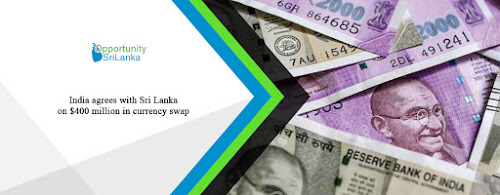India's Reserve
Bank has agreed to a $400 million currency swap facility for Sri Lanka until
November 2022, tweeted on Friday by the Indian high commission. The development
comes amid COVID-19 as a relief to Sri Lanka and will help in its post-pandemic
economic recovery. A currency swap is a trade where two parties exchange
interest and principal in separate currencies.
Currency swaps
used to get foreign currency loans at a higher interest rate than can be
provided by borrowing directly from an international market. The intervention
of the RBI follows a recent bilateral 'technical dialogue' on rescheduling the
outstanding debt repayment to India from Colombo. A currency swap is a trade where two parties
exchange interest and principal in separate currencies. Companies doing
business overseas often use currency swaps to get loan rates in the local
currency that are more attractive than if they borrow money from a local bank.
The Federation
of Indian Chambers of Commerce and Industry (FICCI) in association with the Laxman
Kadigamar Institute of Diplomatic Relations and Strategic Studies recently
organised a webinar on 'Deepening Economic Collaboration between India and Sri
Lanka.' Addressing the webinar, Sri Lankan Foreign Secretary Ravinatha
Aryasinha said the neighbours could explore potential textile, IT and
agribusiness collaborations, sectors in which India was 'powerful.'
Assuring that
Sri Lanka will "facilitate, secure and foster a free environment for
Indian investors," he invited Indian businesses in the production of
industrial zones, automotive parts, pharmaceutical, textile and engineering
activities. Ravinatha Aryasinha also speaking on Sri Lanka's exports, commented
on market access difficulties, difficulties that were often created by
non-tariff barriers in receiving countries. He said they were an impediment and
urged FICCI to work with the Sri Lankan Mission in New Delhi to help improve
Sri Lankan spice exports and concentrate on the Indian market.
Both countries
are currently involved in rescheduling negotiations on debt repayments. The
last round of the debate on Sri Lanka's rescheduling of bilateral debt
repayment took place on July 22. The Indian mission, involving senior representatives
from the Ministry of External Activities, Ministry of Finance, and EXIM Bank,
interacted via a video conference with representatives from the Sri Lankan
Department of External Resources.
A statement from
the Sri Lankan Indian mission said, "The next round of technical
discussions between the two sides on the debt repayment rescheduling is expected
to take place soon”. On May 23, Sri Lankan President Gotabaya Rajapaksa spoke
to Prime Minister Narendra Modi asking the former Indian government to provide
USD 1.1 billion of individual swap facilities under the SAARC project amid the
COVID pandemic to supplement USD 400 million.
OSL Take: Sri Lanka and India boast of strong bilateral and trade ties that have been further bolstered by the free trade agreement (FTA). Sri Lankan businesses are, therefore given preferential treatment when engaging in business ventures in India. Local companies could use this benefit to form joint ventures/partnerships with Indian companies. Foreign businesses/investors looking at doing business with India could explore the possibility of setting up base in Sri Lanka to reach out to the Indian market.
VBS/AT/04082020/Z_TB2

No comments:
Post a Comment